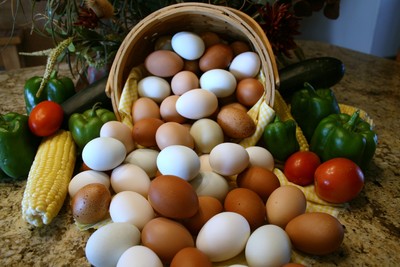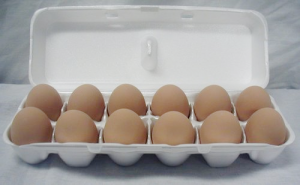
Photo by Steve Taysom
Raising your own flock of layers is a great way to get fresh eggs, but particularly during wet, mucky weather, the chickens will tend to get their eggs dirty. Here are a few things you can do to minimize that:
1. Encourage hens to lay in the nest boxes
Put nest boxes in the coop before your hens start laying. This will give them time to explore the nest boxes and get comfortable with them being there.
Hens prefer to lay nest boxes that are dark and somewhat secluded, so place them away from the main paths of traffic through the coop and orient them so that sunlight does not shine directly toward the box’s opening.
If you have difficulty getting your hens to lay in the nest boxes, you can put in a few ceramic eggs to train them where to lay. The idea is that they’ll see the eggs and recognize the nest box as a safe place to lay eggs.
2. Discourage roosting in the nest boxes
Since chickens produce manure all night long while roosting, you’ll want to prevent them from roosting in the nest boxes. They’ll tend to roost in the highest places that they can get to, so place roosts higher than the nest boxes to encourage roosting on the roosts rather than in the nest boxes.
3. Gather eggs daily
Eggs are more likely to get dirty the longer they’re left in the nest box. Gather them once or even twice a day if possible.
4. Have plenty of bedding in nestboxes
If eggs get accidentally cracked in the nest box, it can be a real mess to clean up, and it soils the nest box, the bedding in the nest box and other eggs in the nest box. To reduce the chances of eggs being accidentally cracked keep plenty of soft bedding material in the nest boxes. Pine shavings work well for this.
5. Have plenty of nest boxes
Aim to have at least one nest box for every five to six hens. If you have too few, sometimes more than one hen will try to occupy the nest box at a time, and that can lead to broken eggs. Plus, with too few nest boxes you’ll have more eggs in a nest box, increasing the likelihood that eggs will get stepped on or jostled around and broken.
Even with plenty of nest boxes, hens may develop a preference for a particular nest box, or often they will prefer laying in a box where there are already some eggs, even though there are other, empty nest boxes.
6. Have plenty of bedding on the coop floor
This helps in two ways. First, if the hens occasionally lay eggs on the floor, they will be cleaner when there’s plenty of fresh, clean bedding there. Second, it helps their feet to stay cleaner, reducing the amount of dirt and manure that they’ll track into the nest boxes and onto the eggs.
7. Washing eggs
Even with doing all the above, you will encounter some dirty eggs. Eggs that are lightly soiled can be cleaned carefully with sandpaper. Eggs that require a more thorough cleaning can be washed, as long as they’re not broken and not too deeply soiled. We offer several products for washing eggs, and we plan to go into more detail on how to wash eggs in a future article.
By following these steps, you can maximize the cleanliness of your eggs and minimize the amount of extra work you have to put in to cleaning them. Do you have additional ways to ensure that you get clean eggs from your flock? Please post your ideas in the comments below.




Would like some further ideas on keeping hay/straw/newspaper in the nests. Our Pearl While Leghorns WILL NOT allow anything in their nests. . . so we were getting many broken eggs. Yesterday, put cut up padded rugs in their nests. Chicks haven’t learned how to drag them out, and so far today, no broken eggs. Any other suggestions?
Remove any uneaten wet food before it spoils.
Some oyster shell is too big to swallow.
Light is essential. Shutting them in a coop for a couple days may hurt your efforts to get eggs. Calcium is important to add into their diet just before they lay too. Calcium to make egg shells inside the hen comes not only from their food but also from their bones. It will drain a good producer if she doesn’t get supplemental calcium. To add quickly-absorbable calcium another trick is to sprinkle calcium directly ON their feed (which should be a good commercial complete feed which already includes calcium). Sure you can buy oyster shell or commercially available calcium pellets, but also you can save your clean egg shells with the membrane. Rinse clean then drain on a towel then toss in an open paper bag to finish drying. When you feel the energy from egg-less frustration, set upon the bag and pulverize the shells beyond recognition. Egg shell calcium would be easier than anything for their bodies to absorb and simply send on to the egg-making machinery right away. Also when you cook chicken you can crock-pot the bones 24 hrs or until the bones are soft, then grind them or mash them and mix them with warm wet chicken feed in consistency of hot breakfast cereal. Your chickens will love it.
I have a question. We have 5 New Hampshire Reds that we got in the beginning of April, 4 hens and a roo. They are beautiful, free range, get a good quality non GMO layer scratch, Sunflower seeds, and cracked corn. These critters are over 6 months old, and Gordon is acting very “rooster-ish”. But we have yet to have an egg. Once in a while we will get the cackle and go inspect. But we never find any.
Any ideas? Someone said it is because it is fall now. We have locked them up for 2 days in the coop. But still nothing.
I forgot, I also put oyster shell in the feed, but they were just throwing it out of the ground. So we put it in a separate feeder for them to get as they want it.
Layers need a 16% protein layer feed to produce steady laying activity. Scratch doesn’t provide that level of protein. I use scratch in the winter months at night so as to help them keep warm at night. Only enough to last for a about five menutes, cus you don’t want to dilute the 16% protein feed. Also, hens usually start laying around 6 months and sometimes a little longer, so maybe they just aren’t ready yet. BUT, stop with the scratch and go to 16%. The Rooster may be interfering with their happiness too. Might be some stress there. Hope this helps.
Anita, the following article may help:
9 Things to Investigate if Your Hens Aren’t Laying Well
I have 55 one year hen and 65 three week old young chicks. I have seen my hen eating eggs, I think, because I have two of them that have soft shells. I also see them fighting over the nest when they try to lay. Even now I check on them two to three time per day and slap them off. However, I still loose three eggs every day. I wish I knew what to do myself. They have a bag of oyster shell, scratch grain, ground corn, wheat, plenty of water, all the weeds that I pick from my garden, and a big yard to be loose in. I get two dozen about every day. I need to find out which laid the soft eggs — this is my problem — and fix it. Excuse if my English is not correct.
Other than placing all hens in separate cages, the only thing I can think of is to watch the hens each day, all day until you find the soft egg layer. Also I would suggest that you start feeding the hens 16% protein layer feed. A diet of bugs and vegetation is OK but it’s not conducive to steady egg production.
Francoise,
I noticed that most of the replies centered on egg eating and not soft shells. I have had success eliminating soft shells by using homeopathic calc carb 30 or pulsatilla 30. You could use it in their watering system. It will often make a keeper out of a cull bird. If your birds are tame and you know which bird has the problem, you can administer in a raisin instead. I use an ice pick to put a hole in a raisin and push the pill inside. This will usually clear the problem up in a couple of days. Calc Carb helps them process calcium correctly. Pulsatilla helps correct the timing of their reproductive sytems. Both are readily available at any health food store where homeopathy is sold.
Same question as Dave. I read somewhere to hollow out eggs and put in mustard. That day ALL eggs were gone including the eggs full of mustard. :(
If no shell is left I wonder if you have a snake that is helping themselves.
I would look for a snake too. I had problems with yellow pine snakes this summer. Found a couple curled around the eggs in the nest, one had just fed on an egg, could see it in the snake. I caught them and called a local pet shop that has exotic animals, he said he had a lot of those pine snakes given to him that were eating eggs. I took them to him, he takes them out into the woods away from people and turns them lose. I didn’t want to kill them, they are not poisonous and keep rats down. Just don’t want to share my eggs with them!
we have found putting hay on the floor of the coop has really helped keep our eggs clean. our chicken like to lay in the corner of the coop. we use a small kids rake to pull the eggs closer so we can pick them up.
Dave, My chickens are less likely to eat eggs if the nest boxes are clean and filled with straw; also, if they have access to oyster shell and high quality layer food.
As for irregular laying, same thing. Clean, tidy nest boxes, good food and consistent light. Use a timer and artificial light to make sure they get 14 to 16 hours a day.
Mine throw the straw out! Hay as well. I haven’t tried pine shavings, will try those.
Mine will NOT keep any sort of bedding in their nest boxes except for the small DOG HOUSE with a flip lid my husband and son made for my very first chicks… We kept it as a nesting box. They love it but I do not have room for many of these. What IS recommended to use if they throw out straw, hay, shavings, etc out of their nesting boxes?
I use crosscut shredded pepper in my nest boxes and my hens all love it and I have wonderfully clean eggs and the worse I get is a shred or two stuck to the shell. It is easy to clean and when I have to clean the floor the pare soaks up all the poop and makes it easier to clean because the ladies do knock it out of the boxes.
This is the solution I recommend for both these problems.
Chickens turn protein into eggs. I have eggs year round and I do it by feeding them as much protein as possible. I feed them the chick starter instead of the layer feed….it has a higher percentage of protein. I mix up the dry feed with milk and canned vegetable juice…carrots and green beans. (I use the vegetables in home made food that I make for my dogs.) I find that even the hens that normally don’t eat the dry chicken feed, will eat it when it is wet up. When I feed them this mash every other day I don’t have egg eaters. I attribute this to the higher protein that they are getting. When I don’t feed them the mash, I will find broken eggs in nesting boxes and egg production goes down.
For hens that eat eggs..first of all, collect eggs a couple times a day, so there are no eggs to eat.
I put the suspects in a cage and feed them corn and chicken feed. I check to see if they are laying eggs. If they are laying eggs they are probably not eating eggs. So if they are layers, I turn them loose. If they are not layers, I keep them in the cage till they are eating good. Many times these are big fat hens and all they have been eating is eggs, so it takes them a while to go back to corn and feed. At first they will refuse to eat. By putting them on a diet of chicken feed and corn it reduces their weight and they don’t need the extra protein after they slim down. When I release them I put a pony tail band around their leg to mark them. If they go right back to eating eggs, I generally cull them. Depends on the hen. Some get caged because I like them. But they certainly get taken out of the population. Normally they don’t go back to eating eggs.
I have had chickens for 20 years and I have developed these methods over the years. I have over 100 chickens. If you want continuous egg laying, you probably need more chickens, because their bodies will take a rest eventually. I have ten year old hens that are still laying, so age has little to do with egg production. My hens give me about 2 dozen eggs a day and in comparing the eggs, these are not the same eggs each day, so the same hens don’t necessarily lay an egg every day. My hens are all free range and they have a rooster.
Thanks Jill,
This is the best advice for egg eaters that I have found.
We just acquired 4 laying ducks. They have never used nesting boxes. They do, however, lay in the “lean-to” we have made them against the chicken coop. We have filled it with straw and change it every two days if there’s been rain. We gather 4-5 eggs each morning. But they are filthy from mud, muck and poop. Can we teach them to get into nesting boxes? They don’t fly well, as you know. If you think we can teach them, please tell me how and how high the boxes should be.
Thanks.
Ducks love a small spot with protection at least one side where they lay eggs. My ducks and geese lay early in the morning allowing me time to drink some coffee :). If the eggs are getting wet just raise the area. I would add more dirt and construct a three sided box without a top to keep the nest area off the dirt. Make sure the box is big enough that they can turn around to get into there comfy spot :). Just set the box on the floor of the shelter.
Two questions:
1. How do I stop my chickens from eating eggs? I have two dozen ceramic eggs and some golf balls in the nest but still they eat eggs.
2. My chickens lay for a while and then stop. Out of 15 hens, maybe one keeps laying. Sometimes they start up again. It does not seem to be tied to weather, hot/cold, etc.
Dan,
1. I had tried every remedy offered to get my hens to stop eating their eggs. I gave up on those girls and figure to let them live out their life. So, I bought another group this past spring and planned to keep them in separate areas. I moved my egg eaters into a smaller pen with different nesting boxes and now I am getting eggs! I don’t know if it helps, but….it’s worth a try.
I also have sixteen total (including the egg eaters) hens that can produce eggs. I get anywhere from 6 to 14 eggs a day. I can’t give any scientific answer for that.
Good luck
1. Over the years the only time I have seen any of my chickens eat eggs is when they are already broken. I think you may have an excess of placebo eggs in the nest. That may be how eggs are getting broken and then eaten. I have never had to train chickens to lay in a nest with placebo eggs. If it is there and viable, they will use it. They do like their privacy so a secluded box works best like the above article indicates. If they are eating eggs that are not already broken it may indicate a shortage of protein in their diet. Sometimes a chicken will get fixated on a certain behavior and you have to break them of that bad habit by making it impossible for them to do and give them a better alternative.
2. Diet can have a direct effect on the number of eggs laid. They aren’t going to lay everyday but they will average 250 or so eggs a year. I have 24 laying now but I only get an average of about 16 or so a day. They have been laying about two months now. I have 19 barred rocks, two orphingtons, two arucanas, and one Silky. I have around fifty dominiques that should start laying this month. If the weather is extremely cold or extremely hot that will slow them down on the laying.
Concerning your second question; how much light are they getting, my understanding is hens need about 14+ hours of light a day. To improve egg production starting in the fall when the days are shorter I put a light in the coop which is plugged into a timer located in my shop. The light comes on about 4:30 pm and goes off at 10:00 pm, giving them about 15 hours of light.
This has helped, my egg production has not tapered off like it used to.
It might be kinder to wake them up early with a light, rather than have the light turn off at 10 p.m. which puts them immediately into darkness before they are settled on their roosts.
i am having the same problem as dave. i have twenty laying hens divided into two seperate laying groups of 8 and 12. each group has a rooster, plenty of roaming room. i have a ten compartment nest box in one pen and four five gallon buckets on their sides in the other. of all the nest areas, they only use a couple and in each pen, a couple hens prefer the ground. i average five eggs a day from hens well under a year. i am starting to believe, more and more, that i have egg eaters, as i have only caught them once since the end of june. they all started to lay well then the heat kicked in and they never layed well again. on two seperate occassions i got a dozen and 14. i have NEVER gotten that many eggs again. im getting a quarter of the eggs i should be. im also thinking chicken snake as ive had golf balls disappear but none recently. im at a loss. impossible to check beaks for eggs w/o stressing them. ive been going out once an hour to check but have found nothing. im open to any and all input. im ready to put them all upmfor sale on clist.
Dave, in addition to all the other good tips that people have given the following articles may help:
9 Things to Investigate if Your Hens Aren’t Laying Well
Why Do Chickens Eat Their Own Eggs?